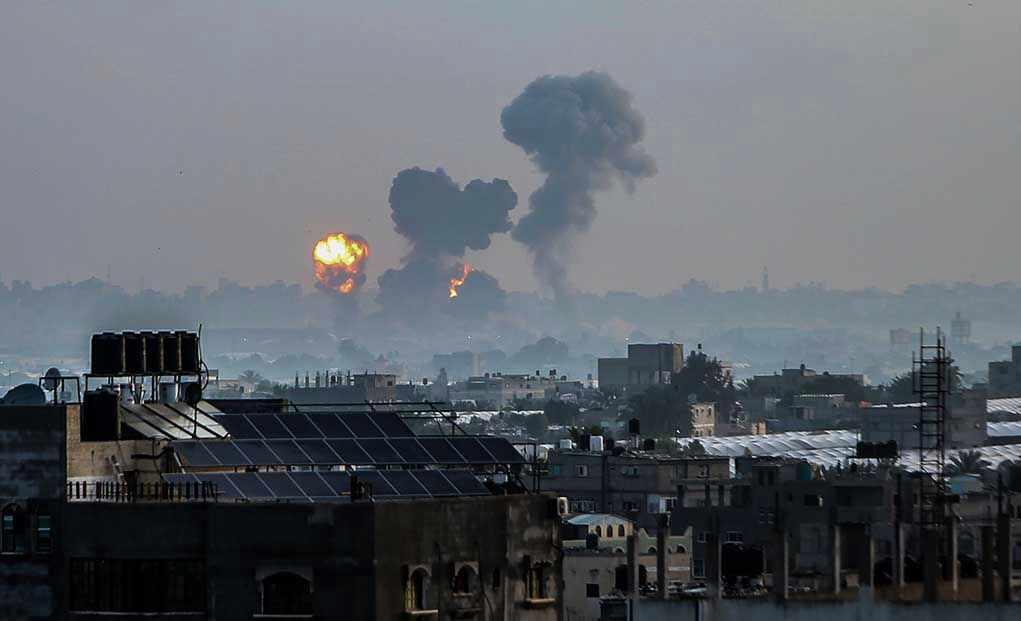
The World Health Organization chief’s stark warning that Gaza hospitals stand “on the brink of collapse” exposes a humanitarian catastrophe that demands immediate international attention and accountability.
Story Overview
- WHO reports only 19 of 36 hospitals remain operational with critical supply shortages
- Israeli military operations have systematically targeted health infrastructure with 697 documented attacks
- Over 1,655 killed and 11,800 injured in attacks on civilian areas since May 2025
- Hospitals operating at 300% capacity while 52% of medicines are completely depleted
Critical Healthcare Infrastructure Collapse
Gaza’s health system faces unprecedented devastation with fewer than half of its hospitals functioning. The World Health Organization reports that only 19 of 36 hospitals remain partially operational, serving over 2 million people with just 2,000 hospital beds. Critical shortages plague the remaining facilities, with 52% of essential medicines and 68% of medical consumables completely out of stock. Four major hospitals suspended operations in the past week alone due to proximity to combat zones.
The systematic nature of these attacks raises serious questions about compliance with international humanitarian law, which requires the protection of medical facilities during armed conflict. Healthcare workers report that treatable injuries have become fatal due to lack of basic supplies and overwhelming patient volumes.
Documented Attacks on Medical Facilities
WHO has recorded 697 attacks on healthcare facilities in Gaza since October 2023, representing a systematic pattern of targeting medical infrastructure. These attacks have forced mass evacuations and closures of critical healthcare facilities, leaving vulnerable populations without access to life-saving treatment. The targeting of hospitals and medical personnel violates fundamental principles of international law designed to protect civilians during wartime.
Medical professionals operating under these conditions describe an environment where basic medical care has become nearly impossible. Emergency rooms overflow with trauma patients while surgical suites lack essential supplies for life-saving procedures. The deliberate restriction of medical supplies through siege tactics compounds these challenges, creating what international observers characterize as collective punishment of civilian populations.
Long-Term Humanitarian Consequences
The collapse of Gaza’s health system extends beyond immediate casualties to create lasting humanitarian crises. Preventable diseases spread unchecked as vaccination programs halt and sanitation systems fail. Children with chronic conditions face life-threatening situations without access to routine medications, while pregnant women deliver babies without proper medical care or sterile environments.
WHO Chief Says #Gaza Hospitals on 'Brink of Collapse'https://t.co/voxdYmbg0b
— Asharq Al-Awsat English (@aawsat_eng) September 18, 2025
International humanitarian organizations warn that rebuilding this destroyed infrastructure will require years of sustained effort and billions in investment. The targeting of health facilities represents not just immediate harm but deliberate destruction of Gaza’s future capacity for self-sufficiency and recovery. This systematic approach to destroying civilian infrastructure raises profound questions about proportionality and adherence to the laws of war that civilized nations must uphold.
Sources:
Gaza health system ‘catastrophic’ with hospitals overwhelmed and medicines running out, WHO warns
Health system at breaking point as hostilities further intensify, WHO warns
Medicine being strangled: MSF doctor on collapse of Gaza’s health system
WHO Emergency Situation: Conflict in Israel and occupied Palestinian territory




